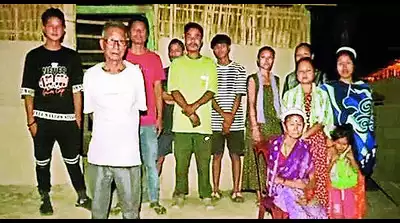In the northeastern state of Assam, a family that has garnered attention for a rather extraordinary reason – they boast a staggering 350 voters within their household. This peculiar phenomenon has not only piqued the curiosity of locals but has also sparked discussions about the dynamics of democracy in India.
The family, residing in a remote village in Assam, has become somewhat of a local legend, drawing visitors and journalists intrigued by their sheer number of voters. In a country where each citizen holds the right to vote, the idea of one family wielding such electoral influence raises questions about the integrity of the democratic process.
At first glance, the notion of a family with 350 voters may seem incredulous, even suspicious. However, upon closer inspection, the reality is far more nuanced. The family comprises multiple generations, with members spread across different households within the same extended family network. What appears as a single family unit is, in fact, a collective of relatives sharing familial ties and, consequently, electoral affiliations.
The phenomenon of large voter counts within certain families is not unique to Assam or India. It is a reflection of the complex social structures prevalent in many parts of the country, where extended families often reside in close proximity and maintain strong bonds of kinship. In such communities, the act of voting is not merely an individual exercise but a collective decision influenced by familial ties, community dynamics, and socio-political factors.
While the sheer number of voters associated with this particular family may raise eyebrows, it is essential to understand that each member possesses the right to vote independently, based on their own beliefs and preferences. The fact that they share a common family lineage does not diminish the autonomy of their electoral choices.
Moreover, the family’s sizeable voter count underscores the significance of community cohesion and collective decision-making in Indian democracy. In many rural areas, where access to resources and opportunities may be limited, families rely on solidarity and mutual support to navigate challenges and assert their interests. The act of voting becomes not only a civic duty but also a means of safeguarding collective welfare and advocating for shared aspirations.
However, the concentration of such a large number of voters within a single family also raises legitimate concerns about the potential for electoral manipulation and undue influence. In a country where electoral malpractices, including vote-buying and coercion, are not uncommon, the presence of a family with significant electoral sway inevitably invites scrutiny.
To address these concerns and uphold the integrity of the electoral process, it is imperative for authorities to enforce stringent measures to prevent any form of manipulation or coercion. This includes ensuring transparency in voter registration procedures, conducting thorough scrutiny of voter lists, and implementing strict penalties for electoral malpractices.
Moreover, initiatives aimed at promoting voter education and awareness are essential to empower citizens to make informed choices based on their own convictions rather than external pressures. By fostering a culture of political literacy and civic engagement, India can strengthen the foundations of its democracy and safeguard the rights of all its citizens, regardless of their familial affiliations.
The story of the family in Assam with 350 voters serves as a reminder of the complexities inherent in India’s democratic landscape. It underscores the interconnectedness of social, cultural, and political factors that shape electoral dynamics in diverse communities across the country. While it may elicit both fascination and apprehension, it ultimately reflects the rich tapestry of Indian democracy, where diversity is celebrated, and every voice, no matter how numerous, has the power to shape the course of the nation.
In addition, the family in Assam with 350 voters encapsulates the intricacies of India’s democratic ethos. Their story highlights the interplay between familial bonds, community solidarity, and individual agency within the electoral process. As India continues its journey as the world’s largest democracy, it must remain vigilant in safeguarding the principles of fairness, transparency, and inclusivity that underpin its democratic framework.


